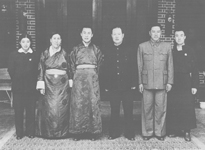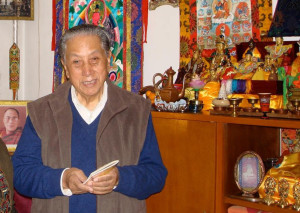Phuntsok Wangyal Goranangpa, founder of the Tibetan Communist Party, official in the Communist Party of China (CPC), and advocate for Tibetan interests, died on the morning of March 30 at a hospital in Beijing. His death follows his hospitalisation in July and recent complications in lung function.
Born in 1922, in Bathang, Kham, Phunwang (as he was popularly known,) founded the Tibetan Communist Party (TCP) in the 1940’s and aspired to a unified and modernised Tibet. In 1949, Phunwang participated in the integration of the TCP with the Communist Party of China. Two years later, he played an influential role in the creation of the controversial “17-Point Agreement,” which promised Tibet regional national autonomy within a sovereign Chinese state. The highest-ranking Tibetan in the CPC, Phunwang also advised and interpreted for Mao Zaedong during his negotiations with the Dalai Lama in 1954-1955.
Phunwang’s continuous advocacy for Tibetan interests aroused suspicion within China’s government, leading to his torture and incarceration in isolation for eighteen years. Rehabilitated and released from prison in 1978, Phunwang declined an offer by the Chinese to lead the government of the Tibet Autonomous Region (TAR), and remained in Beijing.
Following his release, Phunwang became increasingly critical of the CPC’s hard-line Tibet policy. Several of his open letters to Chinese leaders (including former Chinese President Hu Jintao,) criticise a Tibet policy based on “the gun and the renminbi,” [Chinese currency] – this being a reference to China’s policy of rapid economic development in Tibet. A proponent of the Dalai Lama’s Middle Way solution to the crisis in Tibet, Phunwang’s promotion of Tibetan welfare culminated in his recently published book, “A Long Way to Equality and Unity.”
His legacy within the Tibetan community itself is contested. Phunwang is viewed negatively by some for his participation in Chinese government and the 1951 occupation of Tibet. However, Phunwang’s public criticisms of China’s Tibet policy and his support for the Dalai Lama’s repatriation have garnered him increasing approval.

The Dalai Lama (third from left) with Bawa Phuntsog Wangyal (second from right) in 1955
Photo: wikipedia
A statement from His Holiness the Dalai Lama reflects this complex legacy, revealing his affection for Phunwang. At the end of the Medicine Buddha Empowerment on March 31, recalling his days with Bawa Phuntsok Wangyal, His Holiness said, “I am deeply saddened to learn of the passing away of Bawa Phuntsog Wangyal…He was a true Communist, genuinely motivated to fulfil the interests of the Tibetan people. In his death we have lost a trusted friend…Through his own example Phunwang showed that you could be a true Communist while at the same time proud of your Tibetan heritage.”
Sources close to the family note that religious rites will be held in accordance with Buddhist tradition. Phunwang is survived by his second wife, four children, and grandchildren.





 Print
Print Email
Email